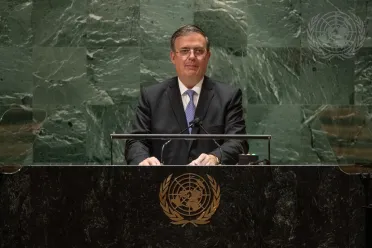Statement
Statement summary
MARCELO EBRARD CASAUBÓN, Minister for Foreign Affairs of Mexico, stated that the unprecedented pandemic crisis cannot be overcome with isolated, unilateral action but rather through renewed cooperation and international solidarity. Equitable and universal access to medicines and vaccines is urgently needed, he said, pointing out that only 1.4 per cent of people in low-income countries have access to vaccines compared to 33 per cent in high-income countries. Vaccines must be seen as a global public good, he said, adding that Mexico will present to the G20 a proposal that the international community recognize WHO-certified vaccines without conditions. Mexico will also contribute to reforming the international health system. It has donated more than 1 million vaccine doses to other Latin American countries.
On global warming, he said in 2020 Mexico presented its nationally determined contribution, which includes not only mitigation commitments but also an adaptation component including nature-based solutions. He cited Mexico’s large-scale “Sowing Life” reforestation programme, under which 700 million trees have already been planted, as an example. He voiced support for the Secretary-General’s report “Our Common Agenda” and the use of additional indicators other than gross domestic product to assess a country’s level of development. On Security Council reform, he said Mexico would continue to work for the organ to be more representative, democratic, transparent and efficient.
Turning to Mexico’s regional collaboration, he highlighted the country’s role in the Community of Latin American and Caribbean States (CELAC) and welcomed the start of the negotiations between the Government and the Unitary Platform of Venezuela. He also urged to end the economic blockade of Cuba, especially in the light of the ongoing health crisis. While supporting the G20’s Debt Service Suspension Initiative and other debt relief programmes for least developed countries, he said similar mechanisms are also needed for middle-income-countries. He reaffirmed Mexico’s commitment to the promotion of human rights and the fight against hate speech, intolerance and violent extremism. Mexico also remains committed to the Global Compact on Safe, Orderly and Regular Migration and it has provided international protection for hundreds of vulnerable Afghans, particularly women and children. Mexico’s feminist foreign policy is in line with its goal of promoting a more equitable and just egalitarian society. The country has exchanged good practices on the subject, which led to the formation of the Global Network on Feminist Foreign Policy. “Sustainable peace is possible only if women and girls actively participate in its consolidation,” he said, noting that together with Ireland, Mexico chairs the Group of Experts on Women, Peace and Security in the Security Council.
Full statement
Read the full statement, in PDF format.
Photo

Previous sessions
Access the statements from previous sessions.
